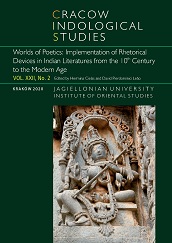Viṣṇu As a Hunter: Pāñcarātra Saṃhitās on Hunting Procession/Festival
Viṣṇu As a Hunter: Pāñcarātra Saṃhitās on Hunting Procession/Festival
Author(s): Ewa Dębicka-BorekSubject(s): Theatre, Dance, Performing Arts, Cultural history, Middle Ages, Theology and Religion, Indian Philosophy
Published by: KSIĘGARNIA AKADEMICKA Sp. z o.o.
Keywords: Pāñcarātra; mṛgayotsava; mṛgayātrā; royal hunt; Vīralakṣmī; mahotsava;
Summary/Abstract: The paper examines Pāñcarātra prescriptions pertaining to a hunting procession/festival (mṛgayātrā/mṛgayotsava), chiefly as held on two main occasions: on the 8th day of mahotsava and on the vīralakṣmyutsava, the latter corresponding with vijayadaśamī which concludes mahānavamī/ navarātri. Through equating the god with a hunter, a ritual hunt displays strong associations with royal power. However, these two occasions of sending the deity for hunting seem to deal with different models of a ruler and his relation to his realm: a ruler who enjoys it (as in terms of a hunting game in a garden) and a ruler who subjugates it (as in terms of new territories traversed while hunting in a forest). As I argue, a key issue in discerning those models appears to be an event of crossing the border of a domesticated space, which also makes the presence of Viṣṇu’s wives on his side impossible.
Journal: Cracow Indological Studies
- Issue Year: 21/2019
- Issue No: 2
- Page Range: 25-67
- Page Count: 43
- Language: English

